
“Road to Qatar!” The Qatar World Cup is just around the corner. Qatar will be filled with passion and fair play! Aren't you excited? The players can get confidence from the support of the people, who in turn can be moved by the efforts of the players. In this way, both players and fans support each other. Jeollabuk-do and Jeonbuk Hyundai Motors Football Club, our local club, has been growing in strength through the efforts of both the team and its supporters.
- Stand Up for Another, Jeonbuk Hyundai Motors
Jeonbuk Hyundai Motors, or Jeonbuk Hyundai for short, was founded in 1994 in Jeollabuk-do. They are the team that has won the most titles, nine K League titles so far. From 2017 to 2021 they won for five years running! Their home stadium is Jeonju World Cup Stadium which is located in Banwol-dong, Deokjin-gu. It can accommodate about four thousand people. Many people have visited here every year to watch Jeonbuk Hyundai's matches. Because of COVID-19 in 2020 and 2021, only a limited number of people could enter the stadium or matches were played behind closed doors. However, in 2019 an average of 13,937 people attended games and on the most crowded day, about two thousand spectators visited the stadium to see the match.
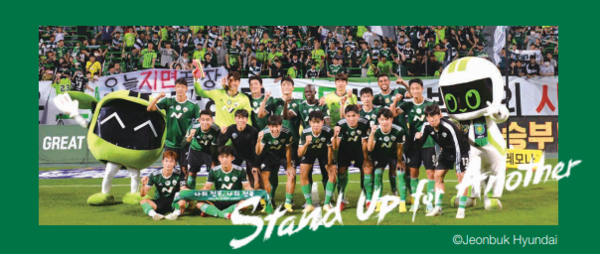
- Supporting Each Other, Growing Together
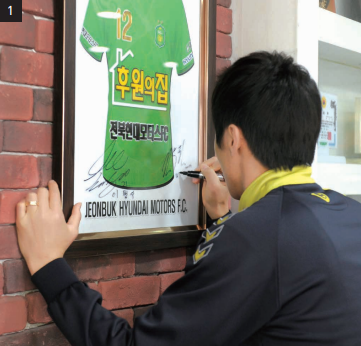
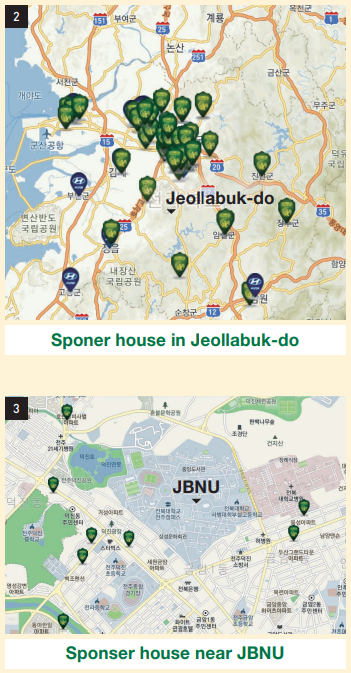
Have you seen a nameplate with ‘Sponsor House’ written on it? Maybe you can see them easily in every corner of Jeollabuk-do. Sponsor House is an official enterprise which voluntarily informs Jeonbuk Hyundai’s game schedules and the team news. At the same time, the club helps increase sales by promoting sponsor houses. As part of this purpose, club players visited a sponsor house and worked as daily clerks. Currently, there are about one hundred and twenty sponsor houses, located all over Jeollabuk-do. Most of them are restaurants and cafes but there are also gas stations and hospitals. They maintain a symbiotic relationship while promoting each other and contributing to the development of the local economy. In addition to this, they also serve the community in other ways. For example, there is 'School Attack', a talent donation program. Players visit schools in person to teach dribbling and shooting skills and offer career mentoring to students. Jeonbuk Hyundai plans to continue to visit more schools and meet more students through this program. As you can see, Jeonbuk Hyundai and Jeollabuk-do are supporting each other and growing together.
- Youth Academy Nurtures Healthy Mind and Body
Jeonbuk Hyundai Youth Academy received the highest rating at the Asian Football Academy level selected by the AFC (Asian Football Confederation). The AFC announced on September 23rd, 2020, that Jeonbuk Hyundai Youth Academy received the highest rating of three stars along with Qatar's Aspire Academy and Vietnam's PVF (Promotion Fund of Vietnamese Football Talents) and was recognized as representative of Asia youth academy. Jeonbuk Hyundai Youth Academy is is formed of thirteen hundred youths in the U-12 beginner’s classes under the age of twelve, fifty youths in the intermediate classes, forty youths in the U-15 of Kumsan Middle School under the age of fifteen, and thirty U-18 of Youngsaeng High School under the age of eighteen. After increasing the number of participants from Jeonju to fifteen hundred, the youth academy plans to gradually open up beginner’s classes in nearby cities such as Gunsan, Iksan, Gimje, Jeongeup, and Namwon and send youth coaches directly to these areas. They plan to make Jeollabuk-do a Mecca of Korean football by bringing children into contact with football from an early age to develop a healthy body and mind. There are a lot of cases where children began their career in a beginner’s class and have risen to fame and fortune in professional football. Meanwhile, Green School is a youth soccer education program that anyone from the age of six to the 6th grade can participate in and operates twenty classes in Jeollabuk-do. ‘Green’ in Green School is a word derived from the first letters of ‘guide’, ‘refreshment’, ‘education’, ‘entertainment’, and ‘new leader.’ Green School's management philosophy can be found in these words.
The JBNU Globe interviewed Choi Eun-mi, who has two children participating in Green School. The elder of her two sons joined when he was six and her second son joined when he was seven. They learn basic football skills for half of the fifty-minute class and play a football game for the rest of the time. They prefer to score goals rather than learn basic skills. She and her husband are also satisfied with Green School because he is a big fan of Jeonbuk Hyundai, and their sons want to run around on weekends. Her eldest son has lots of friends in elementary school. "It seems like my elder son is popular in school. Boys play football in school, and he taught them some skills he learned in Green School. His classmates also registered, and he enjoyed playing football even more," stated Choi.
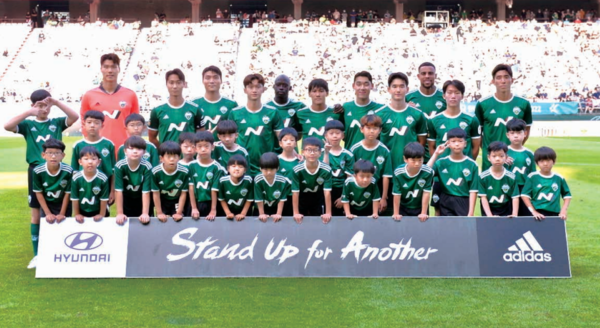
- Social Significance of Local Football Teams
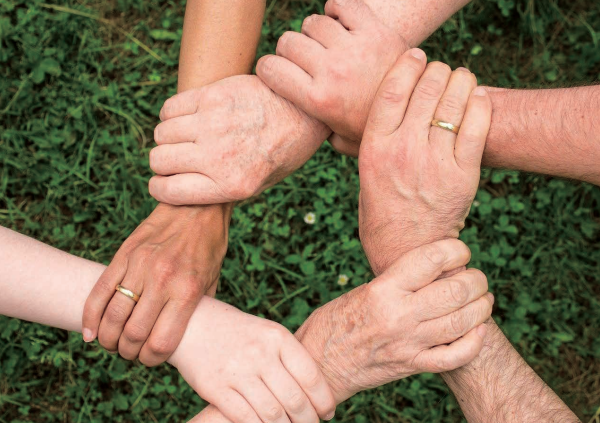
For contemporary social sports clubs as well as Jeonbuk Hyundai, creating social value and connecting with the community is an important task. Choi Jae-Hyun at the Jeonbuk Hyundai PR(Public Relations) team said, "Jeonbuk Hyundai and Jeonju are building partnerships that always strive to enable local community development." In this regard, there is a concept called CSV (Creating Shared Value) established by Porter & Kramer. CSV activities are management activities and policies that not only make an economic profit but also improve social conditions and strengthen the company's core competitiveness at the same time.1 ‘School Attack’ and ‘Sponsor House’ can be good examples of CSV.
Choi Eun-mi, who participated in the Green School interview, said, "the sense of belonging to my favorite football club with my sons playing in their uniforms was considered first, rather than the level or the cost of education." According to this interview, it is definitely an attractive point to wear the same clothes as players in an institution directly under the club, although there are various youth football education institutions in Jeollabuk-do. Referring to a study by Jin Dae-geun and Cho Song-hyun in the Journal of the Korea Sports Industry Management Association, the social contribution activities of domestic professional soccer clubs create a positive image of the club from consumers. This image has a positive effect on loyalty that can lead to continuous watching in the future by encouraging friendly trust and a positive attitude toward the club, as well as a simultaneous effect of perceiving a sense of unity and belonging to the club.2
1Porter, M. E., & Kramer, M. R. (2011). Creating shared value: How to reinvent capitalism. Harvard Business Review, 89(1/2), 62-77
2Jin Dae-geun, Cho Song-hyun (2021). The Structural Relationship between Professional Soccer Clubs’ Social Contribution Activities, Club Image, Club Identification and Club Equity, Korean Journal of Sport Management, 14p
- Local Football Club Influences Local Economy
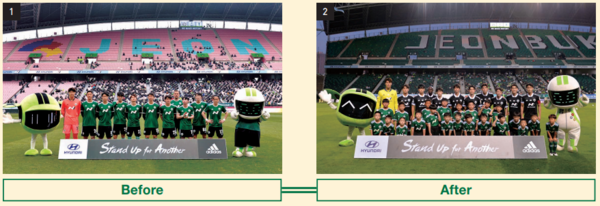
Jeonbuk Hyundai vitalizes the local economy with sporting events. As a leading club in South Korea, Jeonbuk Hyundai competes for various international and domestic cups, and plays relatively more games while heading up to the finals. Away fans from other regions and even abroad travel to Jeonju to support their teams. This benefits local businesses as fans spend money on accommodation, food expenses, and cultural activities within Jeollabuk-do. Then, how can the football club and the local community motivate more consumer spending? According to A Study on Activation Plan of Jeollabukdo Sport Tourism by Jung Kyung-hoi and Lee Il-jae, Jeollabuk-do must design sports tours that include social and natural content. Visitors wanted to experience natural tourist attractions and cultural events. Jeonju Sports Industry Division has worked with Jeonbuk Hyundai since 2019 to promote Jeonju’s cultural aspects including Jeonju Hanok Village and Bibimbap. In addition, the football club posted a fan song video with Jeonju’s Pansori artists, a traditional Korean genre of musical storytelling. These collaborations were for branding Jeonju as a city of tradition and football through media and 30% of Jeonbuk Hyundai’s SNS(social networking service) followers are non-Koreans. Jeonju also held a specialist forum with Hana Tour, Jeonbuk Hyundai, and sports professors on promoting tourism packages through professional football, agreeing on the importance of overnight tourism in connection with culture and tourism.
Jeonbuk Hyundai is taking steps in the right direction. In Relationships between Decision Factor for the Game Spectating of Professional Soccer Spectators and Team Identification, Team Loyalty, and Consumer Behavior by Kim Hae-un, spectator satisfaction is decided by the quality of sports stadiums, players, and services. Jeonbuk Hyundai’s stadium completed its remodeling to provide a pleasant experience for football fans. All its 48cm-wide seats were replaced with 55cm ones, cup holders are now attached to every seat, and photo spots were added. Furthermore, Jeonbuk Hyundai signed an MOU (Memorandum Of Understanding) with JBBA (Jeollabukdo Business Agency) on sports marketing and promoting social values. “Jeonbuk Hyundai hopes to promote local businesses, and help with the marketing process,” said Choi from Jeonbuk Hyundai. “In 2022, Jeonbuk Hyundai supported small businesses in Jeollabuk-do by sponsoring an On-site Solution Dream Bus,” stated Kim Chan-mi from JBBA. It is a custom-made bus for presentations and private meetings. It traveled around the province with experts advising about sanitary diagnosis, securing business funds, and management tax.
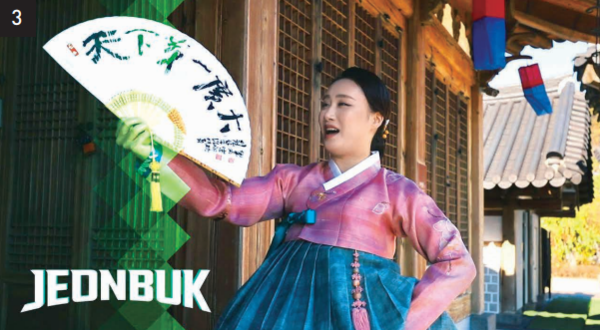
- JBNU and Jeonbuk Hyundai, We are Champions
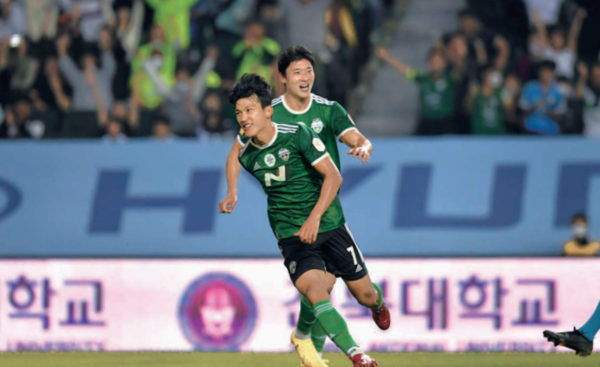
Since Jeonbuk Hyundai signed an MOU with JBNU in 2015, they have carried out various activities together. In the past, faculty and students were invited to the stadium and autograph sessions were held. Choi Jae-Hyun from Jeonbuk Hyundai said, “Jeonbuk Hyundai has not been able to do many activities with JBNU due to COVID-19 in the past two years, but our club would like to do many activities for JBNU and the JBNU students from now on.” He added, “I think the relationship between Jeonbuk Hyundai and JBNU is very important because we can design a developmental future with the students in their 20s who are interested in culture and sports.”
In June this year, open training was held at the JBNU main stadium. It was an opportunity for many students to interact with the players. Choi said, “more students welcomed the team than expected, so the club had a good time. Jeonbuk Hyundai would like to hold the same event again if possible.” Meanwhile, if you want to watch a live game, not just an open training, an on-site discount of 4,000 won for E and N seats is available for JBNU students who bring their student IDs.
A local sports club is more than what it sounds like, if you look closely. Both the fans and the community can experience more than football by interacting with Jeonbuk Hyundai. How about visiting the newly transformed home stadium of Jeonbuk Hyundai next season? Cheer for the Korean national football team in Qatar that has several Jeonbuk Hyundai players, and watch them play in Jeonju next year!
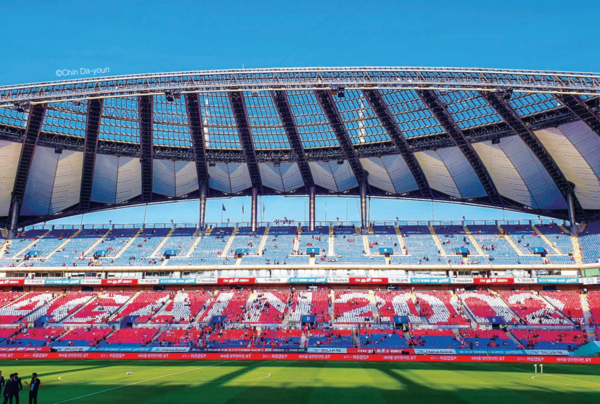
| Chin Da-youn, Han Hee-jeong Editors, Lee Da-yeon, Chae Won-Jin Reporters

